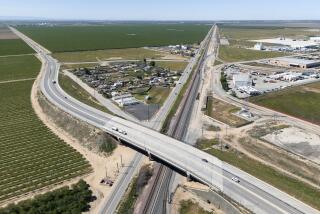Working for the Waltons
- Share via
YOUR FAMILY RUNS A 50-year-old dress shop in a blighted urban neighborhood. Wal-Mart, the world’s largest retailer, announces that it plans to open a 145,000-square-foot megastore a couple blocks away. Closing your shop is not an option, and you don’t want to move. Do you:
A: Get mad and fight?
B: Apply for a part-time job as a greeter?
C: Buy yourself a pair of $18.94 linen pants and turn to your new neighbor for advice?
The answer is C. Or, at least, so says the Wal-Mart brass.
Tired of being blamed for the destruction of small-town businesses, pilloried for underpaying workers, and run out of cities such as Inglewood when it tries to open urban stores, Wal-Mart, an erstwhile family business started by Sam Walton in 1962, has launched a campaign to convince mom-and-pop stores that it’s their friend. Really.
Wal-Mart has pledged to donate $500,000 to local chambers of commerce in 10 urban “zones,” the first in Chicago. The company has hired local minority firms to help build its new stores, and it says it also will offer bonus goodies for mom-and-pops, such as free in-store advertising, opportunities to become suppliers and advice from consultants on “how to thrive with a Wal-Mart in their community.”
If the “Jobs and Opportunity Zones” program sounds like a ploy for positive publicity, that’s because it is. No one really thinks Wal-Mart intends to prop up smaller businesses that would otherwise compete with it. The retailer must expand into big cities if it hopes to keep its business growing, and to do that, it has to stop looking like a bully.
This isn’t Wal-Mart’s only nice-guy PR effort. It recently hired former civil rights leader and United Nations Ambassador Andrew Young to sing its praises, announced improved medical coverage for employees and embarked on a push to be more environmentally responsible.
The irony is that all the PR may obscure the real silver lining in the Wal-Mart cloud, which is that its stores can help residents in struggling neighborhoods -- which often don’t offer good shopping options or jobs. Already 2,800 people have applied for the 400 positions at the Chicago store, which was built on an abandoned site and should provide $500,000 in local tax revenues. Having a nice big discount store down the block could serve to funnel locals into smaller stores, rather than away from them.
And who knows? Maybe the program will spark innovation. Perhaps the new Wal-Mart really will provide a way for small businesses to advertise and find customers, and will successfully mix local products in among the cans of Wal-Mart brand soda. But whether it works or not, one thing’s for sure: We’ll probably all end up working for the Waltons some day. Or at least shopping in their stores.
More to Read
Inside the business of entertainment
The Wide Shot brings you news, analysis and insights on everything from streaming wars to production — and what it all means for the future.
You may occasionally receive promotional content from the Los Angeles Times.










